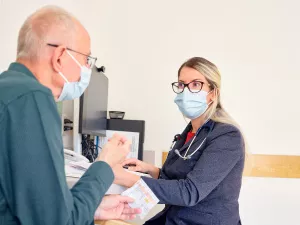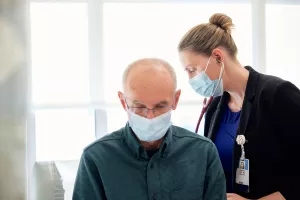Cancer treatments can take a toll on the heart, whether you have a pre-existing heart condition or were already at risk for developing one. No matter where you are on your cancer journey, our team of cardio-oncology experts can help you balance cancer treatments while protecting your heart from cardiac toxicity and heart disease.
Protecting your heart when it's most vulnerable
Cancer alone puts a lot of stress on your heart. Side effects of certain treatments — like chemotherapy and radiation therapy — can also increase your risk of heart disease. When drugs or other substances harm your heart, it's known as cardiac toxicity.
Treating your cancer and protecting your heart is a delicate balance, but you don't have to walk that tightrope alone. With early screening, we'll check to see if you're at an increased risk of heart disease. We work closely with our oncology, radiology and primary care teammates to minimize these risks and set up your heart for long-term health.

Conditions
If you’re already at risk of developing a heart condition, you could be at an even higher risk of developing one as a result of your cancer treatment. Your heart health may become affected due to:
- The type of cancer you have
- Overall disease burden on your heart
- Cancer treatment agents
Cancer treatment may lead to heart conditions, including:
- Heart failure or cardiomyopathy caused by chemotherapy drugs
- Hypertension (high blood pressure) caused by pharmaceutical drugs such as tyrosine kinase inhibitors
- Premature coronary and valvular disease caused by chest radiation
Testing
If your cancer treatment path includes chemotherapy or surgery, we’ll schedule a cardiology risk assessment for you. During your appointment, we’ll check to see if you’re at risk for cardiovascular complications, and if you are, we’ll recommend strategies to protect your heart.
We’ll turn to a variety of tests for your cardiology risk assessment, including:
- Cardiac catheterization (a catheter is guided to your heart to look for infections and damage)
- Echocardiogram (an ultrasound for the heart)
- Exercise “stress” echocardiogram (monitors how your heart reacts to exercise)
- Vascular ultrasound
Your health is our number 1 priority. Depending on your unique needs, we may ask you to pursue follow-up tests so we can get a better picture of your health.
The information we gather from these assessments will inform your customized care plan for preventing cardiac toxicity.
Treatments
Cancer treatments can affect your heart in different ways and at different times. We have the treatments, resources and support to keep your heart healthy — whether you've received a recent cancer diagnosis, are currently receiving cancer care or have moved into remission. Wherever you are in your cancer care, you can trust our team won't miss a beat on your heart care, too.
For people with a pre-existing cardiovascular disease
If you're living with a pre-existing heart disease, we'll keep a close eye on you and your heart throughout your cancer treatment. Your cardio-oncology care can include routine appointments as well as ongoing testing to manage symptoms and prevent the disease from progressing.
For people with newly developed cardiovascular issues
If your body starts to show signs of cardiac toxicity during cancer treatment, we'll prepare an individualized treatment plan. This could involve adding medications to your treatment mix or performing interventions to improve your heart function.
Survivorship care
We work closely with our colleagues in the Survivorship Program to keep an eye on your progress as you move into the post-treatment chapter of your life. At the earliest sign of cardiac stress, we'll be there to create a plan of action.

From regular office visits to inpatient stays, find the healthcare you need and deserve close to home.

Meet the doctors and care team devoted to supporting you every step of the way along your path to better health.